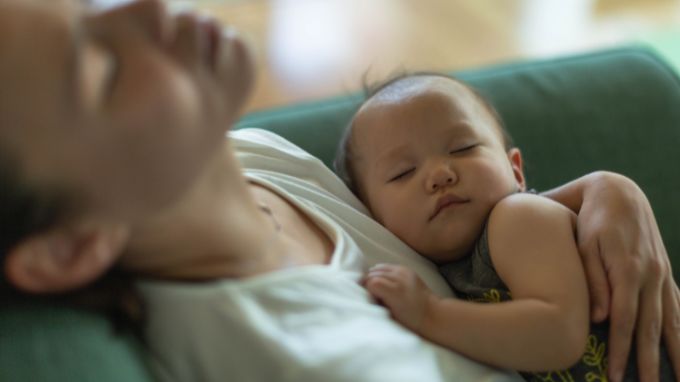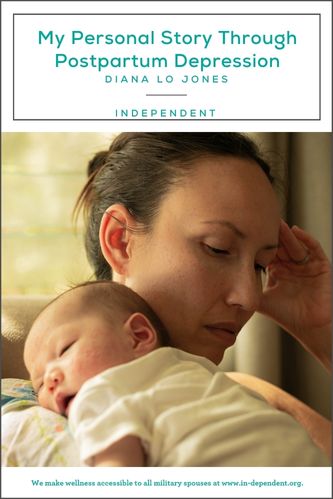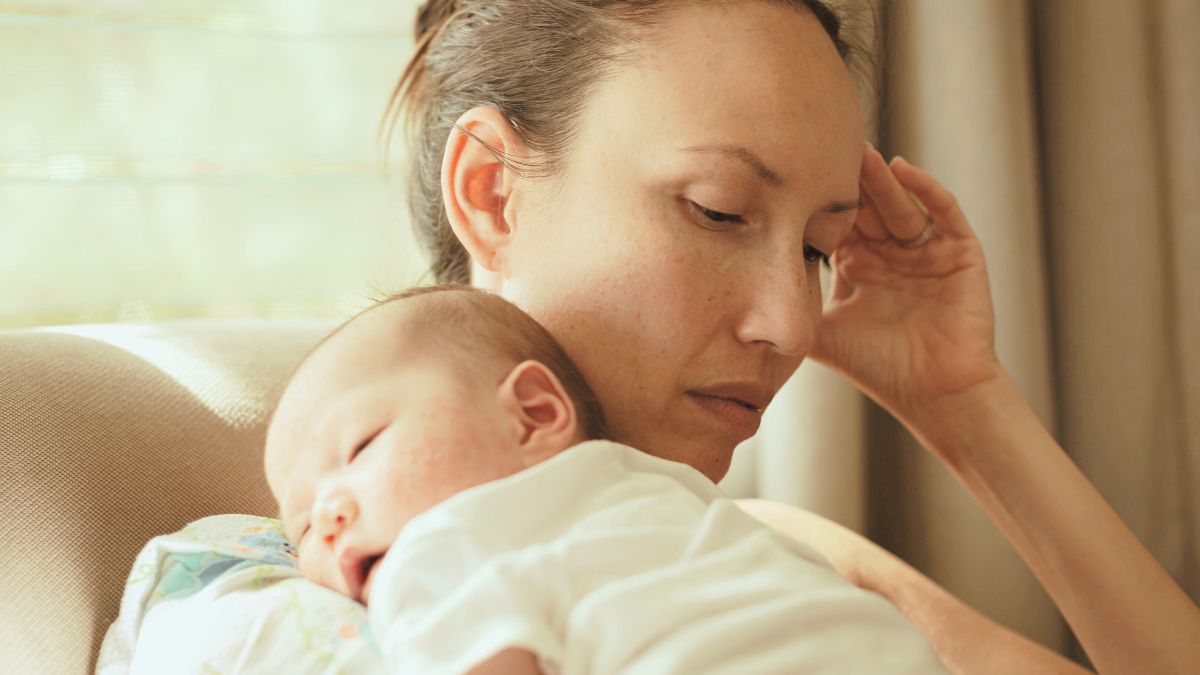The Real Life Spouse Stories Series is part of InDependent’s Wellness Unfiltered™ program. It’s a platform for military spouses to share their struggles with tougher wellness topics. They’re sharing these stories to help with their healing, open up conversations so other military spouses know that they aren’t alone, provide resources to people struggling with something similar, and help the community know how to better help others who are going through difficult wellness issues.
A HISTORY OF DEPRESSION
My first depressive episode happened when I was in college. I knew the likelihood of me experiencing postpartum depression was higher because of this, but I also hoped that I would be alright and that maybe I would defy the statistic.
There’s a reason why there is now more discussion about the postpartum period, from “baby blues” to postpartum depression to postpartum psychosis. As women, our bodies go through so many hormonal changes to create this beautiful, living being. According to an article on healthline.com, “a woman will produce more estrogen during one pregnancy than throughout her entire life when not pregnant.” That’s nuts, right?!

I ended up, not quite consciously, investing in certain relationships to create a supportive environment for myself and my babies. My mother was not available to help during my antepartum or postpartum periods, so I knew I needed to reach out to people. I had a very supportive OB/GYN, I hired a doula for both of my pregnancies, and I established a relationship with a therapist who I felt was the right fit for me. Also, my husband and I were very lucky to be able to stay in the same spot for two tours, meaning I was able to continue this line of care with all of the same providers during both of my pregnancies and the births of my two children.
FIRST BABY AND THE POSTPARTUM PERIOD
I had my first baby and went back to work after three months. My boss was super understanding, and the timing of my son’s birth worked out so I could take the winter off and return in January when the school session started again. I worked at a university library and I couldn’t have asked for a better work environment. It was low-stress, and my boss and colleagues were respectful and kind. There was a nursing room, which two other new moms used during the same period as me. We would write encouraging notes to each other on a notebook left in the room and also coordinated schedules so that those of us who wanted more privacy could have it.
Still, I never felt quite right after the birth of my son. Looking back, I was clearly facing postpartum depression, but I was very much in denial about it. I was still able to go to work every day and come home and take care of my son, but my energy and typical happy self weren’t there. I sought out a therapist, but I was hesitant to take medication for a couple of reasons: 1) I grew up learning that medication was not the way to go with regard to mental health issues, and 2) I was breastfeeding my son and I was worried about having to stop breastfeeding.

I really needed support at that time, and different from anything that could have been provided by my husband or my extended family. I was irritable most of the time and my fuse was shorter than normal. I started making simple mistakes at work, and my attitude toward work had changed, and not because of anything that happened. I felt awful about feeling bad and I wanted to be my happy self, but I felt like I didn’t know how to get there. I was miserable, but I just kept going. Finally, I ended up quitting after going back to work for a year. While it was so I could take care of my son, I also needed that time to take care of myself.
HOW THINGS CHANGED WITH MY SECOND CHILD
I soon became pregnant with my second child, and after that came a turning point for me. With two kids, I couldn’t go through this same haze of living. I finally talked to my doctor about taking medication. It was a hard pill for me to swallow, both literally and figuratively, to advocate for myself and ask my doctor for medication to help with my postpartum depression.
After my daughter was born, I was scared that I would succumb to another episode of depression. However, her birth and subsequent events took over my thoughts; she was born with a cleft palate, which was a complete surprise since it was not shown on any of the ultrasounds during my pregnancy. Needless to say, it was a steep learning curve to learn how to feed her with a special bottle and care for her in particular ways to make sure she was meeting her nutritional needs.

After pumping exclusively for one month, I had a mental breakdown, mostly from the extreme sleep deprivation that I experienced with pumping and feeding her in the middle of the night. People don’t tell you that it is pretty much impossible to do both at the same time. It made me feel empathy for people with twins or multiples who were trying to do it by themselves. That’s what it felt like at times for me.
The mental breakdown I experienced was severe. I started hallucinating and believing things that weren’t real. I ended up checking myself into the local hospital’s psychiatric ward. I was diagnosed with bipolar disorder.
MISDIAGNOSIS AND RECOVERY PERIOD
My OB/GYN and my therapist both advocated for me because they didn’t feel like that was the right diagnosis. My OB actually told me, “You know that sleep deprivation is a form of torture, right?” Looking back, I realized I had been getting about 2-4 hours of sleep a night over the course of the first month of my daughter’s life. I felt so much internal pressure to breastfeed my daughter that I basically sacrificed my own well-being so she could have breastmilk. To be able to “breastfeed her” as an infant born with her particular cleft palate, I had to pump, fill, and feed her through a special bottle, then wash all the pump parts and bottle parts.
This whole process would take me about an hour and a half. Because it was breastmilk she was drinking, my daughter would typically wake up hungry again after three, and not more than four, hours at a time. I think back, and even with my husband helping me on some nights, I would still have to wake up to pump, so I never got the sleep I needed, nor did I get the hormones that your body releases through the skin-to-skin contact of actually feeding your baby through your breast. I felt like a cow, with none of the benefits. There’s a reason why, in these situations, I was assigned a high-risk lactation consultant at the hospital. The likelihood of being able to exclusively pump for an extended period of time is low because it is so hard to deal with all of those factors.

My therapist talked to the psychiatrists who were treating me and mentioned that throughout her years of being my therapist, she didn’t see me as having bipolar disorder. Eventually, my diagnosis changed to having postpartum psychosis, but it wasn’t until after I had already taken medication not suited for me for several months.
With the help of so many people in my community – my OB/GYN, my doula, her trusted friend, my therapist, my sister, my mother-in-law, and my husband – I crawled out alive from the crushing depression I experienced. I don’t think I would be alive today without the support of all of those people, and then some. There were some very supportive nurses in the psychiatric ward, and they kept my spirits as high as they could, given my environment. Once I got home, my OB/GYN and my therapist helped me get my medication changed so that I could finally recover from my episodes of postpartum psychosis and postpartum depression.
YOUR HEALTH MATTERS
As I think back on that time in my life, while I definitely couldn’t see it at the time, I realize that everything eventually turned out alright. My daughter had surgery to repair her palate at age one, and it was successful. My son is six years old, and my daughter is almost four now. There are days when I feel crummy and days when I feel happier.
The change is that I can feel again, and I feel like I’m back to myself. It took reaching rock bottom for me to climb back up and feel alive again.
For me, self-awareness has been the key to finding the right combination for my mental health. Misdiagnoses can happen; doctors are humans, too. I am grateful for the people that I had in my corner and for my own self-awareness in knowing and realizing that the medication I was on made me feel worse instead of better. There is a certain period of time when you start a new medication where it maybe doesn’t feel right, but for me, it lasted so long that I knew something wasn’t right.
Educating yourself on the risk factors associated with postpartum depression is important as well. I tried to surround myself with an army of people that I could rely on should I need help. And I ended up needing that help.

HOW TO BUILD THAT NETWORK
Building and maintaining a support network is difficult and can be even more challenging as a military spouse when you relocate every couple of years. Being proactive and creating that supportive environment could make all the difference when your situation goes from tough to even harder. One way to do this is by using free mental health support resources offered by the military. This could be a chaplain, resources at your installation Family Support/Readiness Center, Military One Source, or through Tricare (search for a Tricare Mental Health Care Provider in your area). Starting early is key, especially if you have a history of mental health illnesses. It’s important to build that relationship with a therapist so that they can help you notice the warning signs when you are too exhausted or sleep-deprived to be self-aware.
Another person to add to your support network could be a doula. Tricare now covers doulas as a benefit, and they can be a valuable support person during pregnancy, birth, and postpartum. Also, don’t forget the awesome friends that you have on your personal contact list! Making time to schedule a phone or Zoom date can help you feel not so alone when times get hard and you are adjusting to life being pregnant or being with a newborn. Since exhaustion and overwhelm are common in new mothers, you can even ask them to call or text you frequently, just to check in and provide you with some support from afar, so it isn’t always on you to reach out.
—
All in all, the truth of the matter is that your health matters. Maternal health matters. Antepartum, intrapartum, and postpartum health matters.
It’s okay to not be okay. But the only way to come back from that is to first admit that you need someone to help you.
Here are some resources for postpartum help and mental health support:
SAMHSA (Substance Abuse and Mental Health Services Administration)
Postpartum Support International


ABOUT DIANA
Diana Lo Jones is a Navy spouse of twelve years. Originally from Southern California, the nomadic military lifestyle she lives has taken her to Japan, the Deep South, the Central Coast of California, and back to San Diego. A lifelong academic and educator, she has her Bachelor’s Degree from UCLA and plans to attend graduate school focusing on the experience of the Asian American diaspora. She currently resides in San Diego with her husband (when he’s not deployed), her two kids, two cats, and a dog (who thinks he’s a cat).

